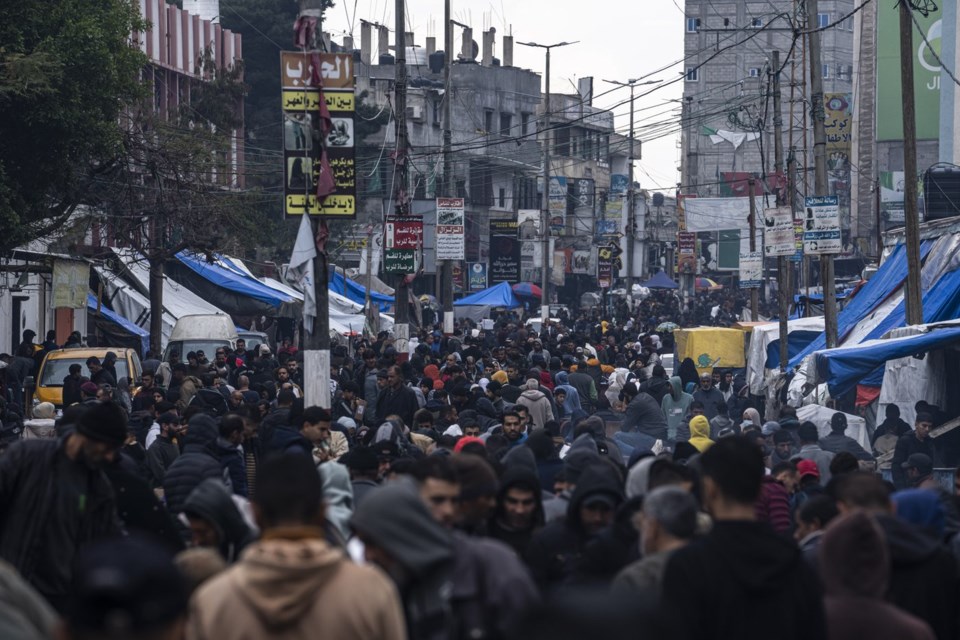DEIR AL-BALAH, Gaza Strip (AP) ŌĆö Israeli forces shelled tent camps for displaced Palestinians north of on Friday, killing at least 25 people and wounding another 50, according to the territory's Heath Ministry and emergency workers.
It was the latest deadly attack in the tiny Palestinian enclave where hundreds of thousands have fled fighting between .
According to Ahmed Radwan, a spokesperson for Civil Defense first responders in Rafah, witnesses told rescue workers about the shelling at two locations in a coastal area that has become filled with tents. The Health Ministry in Gaza reported the number of people killed and wounded in the attacks.
The locations of the attacks provided by the Civil Defense appear to be just outside an Israeli-designated safe zone. The Israeli military said the episode was under review but that ŌĆ£there is no indication that a strike was carried out by the IDFŌĆØ inside the safe zone, using an acronym for the Israeli forces. It did not offer details on the episode or say what the intended targets might have been.
Israel has previously bombed locations in the vicinity of the ŌĆ£humanitarian zoneŌĆØ in Muwasi, a rural area on the Mediterranean coast that has filled with sprawling tent camps in recent months.
Witnesses whose relatives died in one of the bombardments near a Red Cross field hospital told The Associated Press that Israeli forces fired a second volley that killed people who came out of their tents.
The attack began with a munition that only made a loud bang and bright flash, said Mona Ashour, who lost her husband after he went to investigate what was happening.
ŌĆ£We were in our tent, and they hit with a ŌĆśsound bombŌĆÖ near the Red Cross tents, and then my husband came out at the first sound,ŌĆØ Ashour said, holding back tears while clutching a young girl outside Nasser Hospital in nearby Khan Younis.
ŌĆ£And then they hit with the second one, which was a little closer to the entrance of the Red Cross,ŌĆØ she said.
Hasan al-Najjar said his sons were killed helping people who panicked after the first strike.
ŌĆØMy two sons went after they heard the women and children screaming,ŌĆØ he said at the hospital. "They went to save the women, and they struck with the second projectile, and my sons were martyred. They struck the place twice.ŌĆØ
FridayŌĆÖs strikes took place less than a month after an Israeli bombing triggered that tore through a camp for displaced Palestinians in southern Gaza, drawing widespread international outrage ŌĆö including from some of IsraelŌĆÖs closest allies ŌĆö over the militaryŌĆÖs expanding offensive into Rafah.
Israel says it is targeting Hamas fighters and infrastructure and that it tries to minimize civilian deaths. It blames the large number of civilian casualties on militants and says itŌĆÖs because they operate among the population.
Israel is pushing ahead with the military , where over a million Palestinians had sought refuge from fighting elsewhere in Gaza. Most have now fled Rafah, but the United Nations says no place in Gaza is safe and humanitarian conditions are dire as families shelter in tents and cramped apartments without adequate food, water, or medical supplies.
At least 10 Palestinians were killed by Israeli fire elsewhere in the Gaza Strip on Friday. Civil Defense teams recovered the bodies of five people who were killed in an airstrike that hit two apartments in Gaza City in the north, and several others were wounded. An earlier airstrike hit a municipal garage in the city and killed five people.
With now in its ninth month, international criticism is growing over IsraelŌĆÖs campaign of , at a huge cost in civilian lives. The top United Nations court has concluded there is a ŌĆ£plausible risk of .
Israeli ground offensives and bombardments have killed more than 37,100 people in Gaza, according to the territoryŌĆÖs , which does not distinguish between combatants and civilians in its count.
Israel launched the war after , in which militants stormed into southern Israel, killed some 1,200 people ŌĆö mostly civilians ŌĆö and abducted about 250.
___
Associated Press writer Jack Jeffery in Ramallah, West Bank, contributed to this report.
Wafaa Shurafa, The Associated Press




